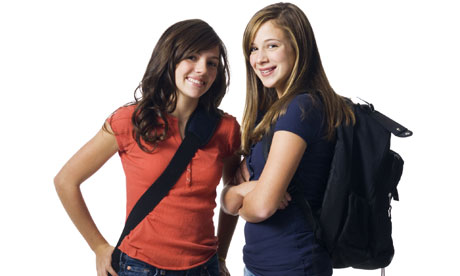
Whose secondary school child doesn't leaves the house without staggering under the weight of a schoolbag? Textbooks, homework, packed lunches, lab coats, sports kits and musical instruments tend to stay in their bags all day because the school lockers are usually too far away to be useful.
A range of studies show that their bags weigh between 4 and 7.7kg, which researchers estimate is between 10% and 17% of the bodyweight of a 12- to 14-year-old). But does it matter? They are young and can bounce back, can't they? Apparently not, says research published last week in the Archives of Disease in Childhood. A study of 1,403 Spanish children aged 12 to 17 found that 61% had backpacks exceeding 10% of their bodyweight and that these children were more likely to get back pain than children carrying lighter bags.
The solution
Studies reporting back pain show a huge variation in how common it is in adolescents – ranging from 8% to 74% (definitions of back pain vary, with some studies including neck and shoulder pain). But there is some evidence that people who have back pain when they are young are at increased risk of having it in adult life – a study of 10,000 Danish twins said the risk was up to four times higher.
This latest research does not prove that heavy bags cause back pain in adolescents – it only shows that there is an association. Back pain is also caused by sedentary lifestyles; being slumped in front of the television leads to weaker back muscles and an increased likelihood of back pain. While carrying a heavy bag affects how you walk (for example changing the head-neck angle, making the shoulders asymmetrical and increasing how much the hips and knees move), there is no evidence that it causes any lasting deformity such as scoliosis, which is a curvature of the spine.
At least one study has found no direct link between how heavy a bag is and how likely an adolescent is to complain of back pain – the researchers suggested that emotional factors might influence whether an adolescent complains of pain. If a child isn't happy at school, they might feel the weight of their schoolbag more. But it seems common sense to check your child is carrying only what they need for that day, and in a bag that is comfortable.
Backpacks should be best for backs because they have two shoulder straps – a bag carried on one shoulder is more likely to cause pain. But often backpacks end up weighing against the lower back. They should be packed so that the heaviest items are against the back, but distributed evenly. The bag should be sturdy and have wide, padded, adjustable straps. If you can get a backpack with hip straps, this will provide additional support for your child's back. Encourage them to use school lockers for items they don't need that often.

